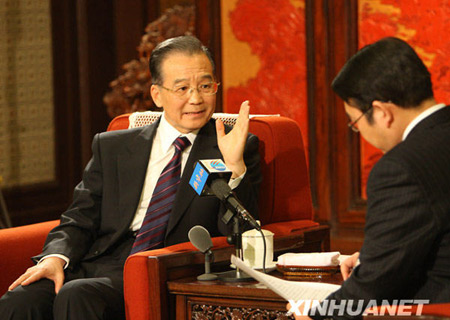Government and Policy
China won't yield to yuan appreciation pressure: Premier
(Xinhua)
Updated: 2009-12-27 15:25
 |
Large Medium Small |
 |
| Premier Wen Jiabao answers a question in an online interview with Xinhua News Agency in Beijing on December 27, 2009. [Xinhua] |
BEIJING: China would not yield to pressure for the appreciation of its currency yuan, or renminbi, in any form, Chinese Premier Wen Jiabao said on Sunday.
"A stable Chinese currency is conducive to the international community," Wen told Xinhua in an exclusive interview.
Some countries demanded the yuan appreciation while practicing trade protectionism against China, said Wen, adding that this in essence was aimed at checking China's development.
"China will work together with other countries to curb trade protectionism and push forward the Doha Round trade negotiations," Wen said.
He said that the global economy could not make progress without trade between different economies.
"We all know this, but what we need now is the willingness to take action," Wen said. Chinese exporters were under great pressure due to trade protectionism, he said.
Figures from the Ministry of Commerce showed that as of the end of November, 19 countries and regions have launched 103 trade related investigations against Chinese products. Both the number of the cases and the money involved was at record high.
Export value of Christmas-related products from China's eastern Zhejiang Province fell 28 percent in 2009 compared with average levels of previous years, due to waning foreign demand and trade barriers in various forms, Wen said.
From January to November, China's imports and exports totaled $1.96 trillion, down 17.5 percent compared with the same period last year. In breakdown, exports stood at $1.07 trillion, down 18.8 percent year on year, and imports at $893.02 billion, down 15.8 percent, according to the General Administration of Customs.
"Chinese exporters need to upgrade their export systems and improve product quality in order to keep their global market share amid an unfavorable trade climate," Wen said.
Dialogue with netizens
Chinese Premier Wen Jiabao said on Sunday he would continue his dialogue with netizens before the annual Parliament session in March next year.
He made the promise in an exclusive interview with Xinhua on Sunday afternoon at Ziguangge building inside Zhongnanhai, an office compound of the central authorities at the heart of Beijing.
Stimulus package effective
Chinese people should be proud of the country's economic performance as the government's economic stimulus package proved effective, Wen Jiabao.
China's economic growth has approached its pre-crisis level a year after the adoption of the 4-trillion-yuan ($585.6 billion) economic stimulus package. The country's gross domestic product (GDP) grew 8.9 percent year on year in the third quarter of this year, accelerating from 7.9 percent in the second quarter and 6.1 percent in the first. In the third quarter of last year, its GDP rose 9 percent from a year earlier.
However, it is too early to grade the performance as the global financial crisis is not over yet and a lot of work is still on the way, Wen said.
"We will have to pay some price and face some unexpected difficulty in tackling such a big crisis," he said.
He took the country's credit expansion as an example.
"It would be good if our bank lending was more balanced, better structured and not on such a large scale," he said.
Wen said that the State Council had noticed the issue in the middle of the year and started to correct it. "It has been improving in the second half of this year," he said.
Wen admitted that lending by Chinese banks had been growing on a too large scale as a result of the nation's immediate response to curb the aftermath of the global financial crisis.
Confidence, cooperation
He said the government had stressed confidence, responsibility and cooperation in dealing with the effects of the global economic crisis.
"Since the very beginning of the economic crisis, we have felt no country could evade the grave impact of crisis or solve it alone," Wen said.
"(The international community) must strengthen cooperation to deal with it together."
Referring back to his speech to the United Nations in New York in September last year, Wen said confidence was more economically important than gold or any currency.
"As a big developing country, China must run its own affairs well and leave no trouble for others," he said. "We acted as promised."











